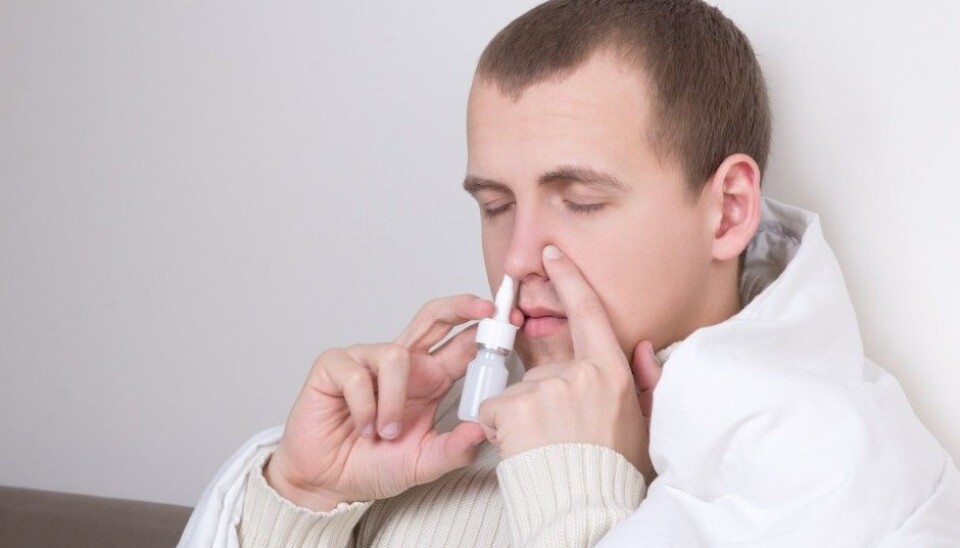
Mentally ill might spray away some of their troubles
Norwegian scientists are involved in the development of a nasal spray containing a hormone that might make life a little easier for people with mental illnesses.
Denne artikkelen er over ti år gammel og kan inneholde utdatert informasjon.
The hormone oxytocin has a number of functions in the body.
It helps in starting a childbirth; it affects emotions of people who are sexually attracted to one another, triggers intimacy and bonding, as well as playing a number of more mundane functions in the body.
Previous research has already shown that oxytocin has an effect on social relations.
“It can make people more social and less suspicious of others,” says Ole A. Andreassen.

He is a professor and researcher at NORMENT KG Jebsen Psychosis Research Centre at the University of Oslo (UiO) and the Oslo University Hospital.
Andreassen has taken part in a new study of oxytocin nasal spray, which published its results in Translational Psychiatry. The study involves collaboration between the research centre and the firm OptiNose, which developed the spray. Andreassen has no financial interests in the company.
The researchers think oxytocin spray might be developed as a medication for patients who have severe problems dealing with social situations, such as patients with schizophrenia or autism.
“As you know, patients with psychoses can be hyper-suspicious and feel that people are out to get them,” says Andreassen.
“The results are very promising but it’s important to remember that a lot of development work remains before a medication might be available for common clinical treatment.”
The medical researchers behind the new study see signs indicating that the nasal spray really makes people more amiably disposed towards others.
Double-blind
The researchers investigated how the nasal spray worked on 16 healthy male test persons.
They were divided randomly into groups. Some were given the nasal spray with oxytocin, others received it in a larger dose, some were given a placebo and some received oxytocin intravenously.
This was a double-blind study, so neither the men being tested knew whether they received a placebo nor did the testers until afterwards.
But how to test whether people have become more social?
The participants were shown a series of various faces. These portraits had ambiguous expressions and the test persons were asked to suggest what humour they were in.
It turned out that those who received the nasal spray interpreted the faces as less angry than those who too the spray.
Why nasal spray?
“The effect of oxytocin out in the body is well known, but it is hard to get it into the brain. We wanted to test whether it could be delivered to the brain through a nasal spray,” explains Andreassen.
The nasal spray gets far up into the nose, near the nerves that register smells. The theory is that oxytocin is transported to the brain through the nerves and influences the person functions in social situations.
“The hormone has many different effects in the brain, but you can’t just take an oxytocin tablet and get the same effect.”
Nor did the researchers find the same effect when the participants received the hormone intravenously, introduced into their bloodstreams.
Andreassen explains that much work remains before the best way to deliver the medication is found, and of course this entails additional research.
16 persons
But if the medicine is being tested, why not use more than 16 persons?
“We are looking at the effects on individual persons, so the effect has to be significant enough to be measured with test persons,” says Andreassen.
If they had to use a larger number of test persons to find effects, perhaps the medicine did not work sufficiently well to be a medication for individual patients.
No down-sides to Oxytocin?
Lots of research has been done with the hormone in the past few years. It has not shown that oxytocin has positive effects on everyone.
A study from 2010 investigated 31 men who were given oxytocin as a nasal spray. They answered questionnaires charting what sort of social ties they had to family and friends.
They were also asked about their mothers’ parenting styles when they were children.
Those who had more anxieties in their relationships in general took a less positive view of their mothers after a sniff of oxytocin.
The opposite happened with participants who had warm relationships with their mothers. Their memories of mum were even rosier with the drug than without it.
“Individuals are different and we are not saying this is a drug that will work wonders,” says Andreassen.
“But in our tests we haven’t seen anything to suggest that it doesn’t work favourably.”
“The possibility of developing new medications is much of our motivation for running these tests. Many medications used in psychiatry have side-effects. Perhaps the nasal spray will have fewer serious side-effects.”
“We still have a long way to go before this could be a finished product,” says Andreassen.
This was a so-called phase-1 clinical trial, in which the medication is tested on a small group of healthy adults. Later it will have to be tested on a small group of patients, and thereafter on a large group of patients.
-------------------------------------
Read the Norwegian version of this article at forskning.no
Translated by: Glenn Ostling
Scientific links
- D.S. Quintana et al: Low-dose oxytocin delivered intranasally with Breath Powered device affects social-cognitive behavior: a randomized four-way crossover trial with nasal cavity dimension assessment. Translational Psychiatry, juli 2015. DOI: 10.1038/tp.
- Jennifer A. Bartz et al: Effects of oxytocin on recollections of maternal care and closeness. PNAS, desember 2010. DOI: 10.1073/pnas.1012669107


































